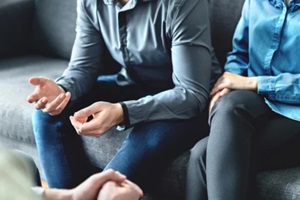
Many people think couples therapy only for couples who are facing big problems in their relationships, but that’s not true! Couples therapy is a great way for anyone to learn more about themselves, their partners, and the way they interact, as well as how to improve any issues.
Sometimes, people may not realize they have healing to do until they spend some time being vulnerable and open with their partner, and therapy is a safe and productive way to facilitate this.
Every person is unique, and their way of viewing the world, other people, and themselves will naturally vary as a result.
However, regardless of who you are or where you come from, there are many healing techniques that partners can cultivate through the use of couples therapy to help their relationship stand the test of time.
Here are a few healing techniques that can be beneficial:
Active Listening and Communication Skills
The basis of many useful relationship skills is communication. Communication is more than simply saying what is on your mind; instead, effective communication comes down to three main practices: reflective listening, non-verbal cues, and conflict de-escalation.
- Reflective listening can take practice, because many people listen in order to respond. However, good reflective listeners will hear their partner’s words not with the intention to respond, but with the goal of hearing and understanding what they are saying. A therapist can help partners practice reflective listening by guiding the conversation and helping each party break apart what is really being said.
- Non-verbal cues are another important element in a relationship. If one partner says the word “yes” to holding hands but does not seem very enthusiastic and keeps a distant, shallow grip, this is an example of a non-verbal cue that may indicate they are not be comfortable. Couples therapy can help partners to feel more open about saying what they mean while simultaneously equipping them to identify the other person’s methods of speaking non-verbally.
- Conflict de-escalation is a valuable tool that can be learned in couples therapy. This may include other practices such as reflective listening (rather than responsive listening) and determining what behaviors make each party feel attacked or heard.
Building Empathy and Understanding

In addition to good communication, couples therapy can support healing by building empathetic connections. A therapist may guide partners to step into each other’s shoes and take situations from their perspective.
They can also help partners to stop problematic emotion mirroring—when, for instance, one partner comes home angry and the other grows angry as a result of that energy. However, emotion mirroring can be a good thing when practiced with care!
Addressing Attachment and Intimacy
One sensitive area in which many relationships struggle at some point is intimacy. Sometimes one person’s libido does not match the other, and in other cases, a person may feel emotionally distant from their partner, impacting their willingness or ability to establish intimate connections with their loved one.
One of the most useful steps is having a couples therapist help partners identify the attachment theories that underpin their behaviors. “Attachment theory” refers to the many ways in which a person can view relationships and the bonds they form throughout life.
For instance, a person with an avoidant attachment style may find emotional or intimate closeness challenging, because they have learned through lived experience not to depend on relationships to meet their needs.
If a person’s challenges with attachment stem from emotional and psychological issues, a therapist can help them to reestablish the emotional bonds that keep a relationship strong. In cases in which physical contact is problematic, other approaches such as sensate focus exercises can be helpful.
This allows each partner to come into physical contact with each other without any expectations; instead, the practice simply requests that the person being touched focus on tangible elements, such as temperature, the amount of pressure being exerted, or the feeling of the other person’s skin texture.
Over time, this can rebuild tolerance for physical touch and decouple negative mental states from the physical contact that once caused them.
Grow Your Relationship with Couples Therapy

Couples therapy is a valuable opportunity to be vulnerable, develop new skills, and hone existing good practices to contribute positively to a relationship over the long term.
Finding a couples therapist with whom you have good rapport can feel daunting, but the time investment is worth it for the well-being of you and your partner.
The team at Village Counseling is proud to provide culturally competent therapy that is founded on evidence-based science to help participants actively discover themselves and their partners.
By achieving improved mental well-being and moving past a person’s inner challenges and turmoils, they can in turn manifest more positive behavior in their relationships with others. Contact Village Counseling to schedule a couples therapy appointment.
